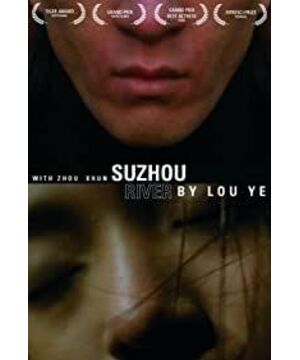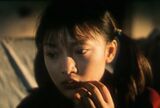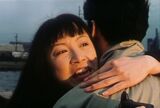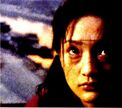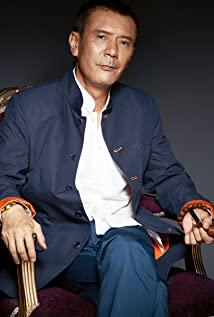Suzhou River is a common name for the tributary of the Yangtze River that passes through Shanghai. It is dirty and smelly, but it precipitates the prosperity, memory, bitterness and past of the city. In Lou Ye's film, Suzhou River is a symbolic carrier. In the editing of the film, the tone it wanted to express was established. Everyone was busy on and around the river, and sprayed advertisements on the riverbank. It seems that this is not the Shanghai we imagined. Around, everything is so harmonious and natural, as if the film is just expressing the Suzhou River itself. "Suzhou River" is one of the representative works of the sixth generation of directors. We can clearly see a different style. Both the narrative rhythm and the audio-visual language of the film are all hypothetical. Lou Ye abandoned the fifth generation of directors. The omniscient narrative that the acting director often uses, but instead uses the method of personal narrative. The film no longer pays attention to the montage of the big vision and the close-up, and there are few objective perspectives, but chooses to tell the story from a subjective perspective. Most of the shots in the film are shot from the perspective of the photographer "I", just as the "movie eye" theory practiced by the founder of the Soviet documentary film Jiga Vertov - the eye that the camera captures life unexpectedly, he The mise-en-scene, the script, and what the actors call bourgeois are all rejected in favor of live-action shooting. We see Meimei's hair sticking to the camera and Meimei's lips on the camera in "Suzhou River". But the audience can only see my hand, which was a very fresh visual experience at the time and the assumption was reflected in seeing the outside world from the perspective of "I", when I was not there, everything that happened was just " Maybe "only what I see is true. In this way, the film uses the change of perspective to disrupt the audience's thinking and vision, making the film more hypothetical. Although the film is full of assumptions and doubts about love, the constantly shaking footage conveys a certain truth. The authenticity of the film is first manifested in the characters. All the characters mentioned in the film are abandoned under the general environment. They do not communicate with people in reality and are immersed in their own world. This is why the film uses a large number of voiceovers to narrate the story. The atmosphere of muttering can better reflect the closed psychology of the characters and increase the edge Sex, the authenticity conveyed by the film is more derived from the reality of life. The background of the film takes place in Shanghai in the 1990s, which should have been a prosperous place, but we have not seen a metropolis comparable to New York. There is only a flowing river, a cloudy sky, a dilapidated house... Only the looming Oriental Pearl Tower in the short haze can remind the audience that this is Shanghai. The film intends to create such a place far away from the "mainstream" to better express the nature of the edge, and through the nature of the edge we see that The pursuit of love, judging from the lines that I broke up with Meimei, "are we breaking up now, or after we have sex?" In that era, how could there be any love, Ma Ma didn't know what love was, and the initial interest relationship had long been used. He blinded him, and Peony didn't understand what love was. She lacked love since she was a child, but she was full of curiosity about the world. Meimei didn't know what love was. Knowing that she really saw Peony and Ma, she left me behind. That note, which reads: find me if you love me, everything is being pursued, and the interesting point is that all the characters in the film have a one-way relationship. When Peony pursued the motor, the motor did not regret it. New, Ma and Meimei are together only because Meimei and Peony are very similar, and Meimei always thought that Maa made up Peony to pursue herself, and the note left at the end is also Meimei thinking that I will go to find her, the video I have been expressing this pursuit complex, which is in line with the characteristics of the times at that time. In the developed industrial environment, many people choose to leave the countryside to work in the city, and many people are in a state of "rootless". They drink the same brand of beverages. Wearing the same brand of clothes, people lose their characteristics, why do they like to drink, they hope to find a difference, they are confused about their identity authentication, as if they are all "floating" in this world. Maybe it's all just my fantasy. There is no tragic love story between Peony and Ma, and I don't have the kind of relationship I want with Meimei. I often stay in the room alone, looking through the window. People outside are often busy with life, Meimei is just a sustenance in the heart, and the love story between Peony and Ma is just an excuse for me to numb myself. Although the production of "Suzhou River" gives people a messy feeling, the structure of the film is very standard, and the change of perspective, emotional distribution and polyphonic narrative can be well used. When applying for a job, the length is generally, the narrative perspective is divided into two parts, and I construct the love story of the motor and the critical point where the motor completes his own story. Under this, the motor escapes my narrative control and becomes another living in Suzhou River. people around. It can be seen from this that the director's changing perspectives in the film not only successfully meet the special needs of the narrative structure, but also complete the construction of the theme from different perspectives, presenting the essence of fiction through the narrative structure formed by different perspectives come out. In the whole process, the appearance of different perspectives and different narrators is ultimately attached to the director himself. In Kundera's words, it is the author's sense of unity that gives them independence, forming a "polyphony" that shifts perspectives. "Polyphony" comes from the musical term and refers to the simultaneous development of two or more separate voice melodies. , although the whole movement is closely combined, it still retains the independence of each part. Bakhtin uses this term to evaluate the characteristics of Dostoevsky's novels. He argues that "a true polyphony of distinct voices of sufficient value, with a multitude of separate and unintegrated voices and consciousnesses, is indeed characteristic of Dostoevsky's novels." "Bakhtin The emphasis is on the independence of the protagonist's self-consciousness, the dialogue, the equality between the protagonist and the protagonist, between the protagonist and the author." Genette developed Bach on the basis of a close reading of Proust's "Reminiscence of Time Like Water". Jin's "polyphony" developed the theory of "polyphony" from the "internal theoretical tone" to the scope of narrative techniques. He called the variation of narrative style caused by the shift of narrative point of view as polyphony. The birth of "Suzhou River" seems to be a very experimental text, both in narrative and audiovisual language. To a certain extent, Lou Ye used Suzhou River to complete his construction of the space of miscellaneous languages, which also provides us with a different kind of experience. The film records the lives of some "people at the bottom", a group of people who cannot be ignored. Among them, there are irregularities and ugliness, and there are things that most of us have in common. We have experienced the colorful world, the hardships and preciousness of life, and realized some things worth cherishing, and some things are eternal.
View more about Suzhou River reviews


